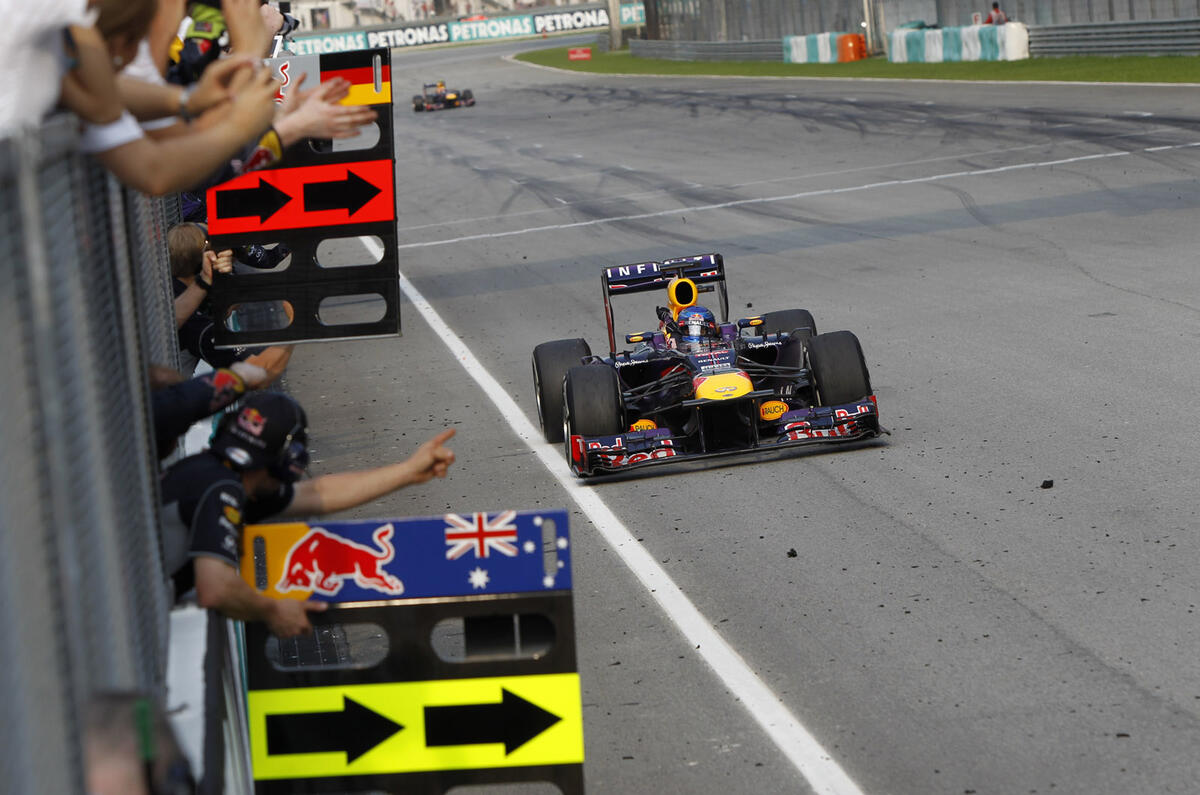Sebastian Vettel won a thrilling and controversial 2013 Malaysian Grand Prix, the second Formula 1 race of the season being enlivened both by rain and two intra-team battles between the Red Bull and Mercedes team-mates at the front of the field.
Pole-sitter Vettel led the race away in his Renault-powered Red Bull, but on the wet but drying track opted to stop early for slick tyres. That proved to be marginally the wrong decision, and fast-starting team-mate Mark Webber was able to leapfrog him during the pit sequence.
At that point in the race Mercedes racer Lewis Hamilton moved up to third, despite pitting outside his old team McLaren's garage initially. He quickly realised his mistake, and soon closed the gap down to Red Bull team-mates Webber and Vettel to make it a terrifically close three-way fight for victory.
The trio provided lap after lap of enthralling racing, but as the race and pitstops unfolded, it became clear that the battle for glory would boil down to the Red Bull pairing. Despite frantic calls from the drivers' pit crew to take care, the two duelled wheel to wheel for many laps in an enthralling battle.
On lap 46 team boss Christian Horner was heard to tell the triple world champion that his dogged attacks against his team-mate were getting "silly" - just as the German finally made the most of his DRS advantage and made a move stick. A disgruntled Webber hung on for second.
After the race Vettel was told by his team that "there will be some explaining to do" while the broadcasters blocked Webber's response when congratulated on his second place finish by his pit crew.
Post-race Webber added: "I want to race as well, but in the end the team made a decision which we always say before the start of the race is how it's probably going to be: we look after the tyres and get the cars to the end. In the end Seb made his own decisions today and will have protection as usual, and that's the way it goes."
Vettel later apologised in an official team statement: "I took quite a lot of risk to pass him and I should have behaved better. It doesn't help his feelings right now. Apologies to Mark and now result is there, but all I can say is that I didn't do it deliberately."
Meanwhile, as Hamilton slipped off the pace of the lead duo he found himself under attack from his team-mate, Nico Rosberg, who was consistently quick, if less dramatic, throughout the entire race. The race between the team-mates raged for many laps, until team boss Ross Brawn ordered an end to the battle with a couple of laps to run, leaving Hamilton to take the final podium spot.
Following the race, Rosberg appeared to suggest he could have beaten Hamilton, asking the team to "remember this one" on the radio.
Ferrari's Felipe Massa enjoyed a competitive but relatively quiet run to fifth. Team-mate Fernando Alonso had enjoyed a great start to the race, but slid in to the back of Vettel's Red Bull early in the opening lap, damaging his front wing. At the start of the second lap the front wing broke, pitching him off the track and in to retirement.





























Join the debate
Add your comment
No Longer Watch
I used to love Formula 1, back in the '70s, '80s and '90s, but the post by NMGOM is 100% spot on and exactly the reason I can't be bothered to watch it any more. I just don't care about a race which isn't actually a race. I understand people saying that Vettel is effectively an employee and should do what his boss tells him, but I believe that his job title is RACING DRIVER. The fact that he also sees himself as a RACING DRIVER is the reason that he has won 3 world championships. Webber clearly sees himself as just an EMPLOYEE, or a passenger in a fast car.
Can anyone here imagine Senna or Schumacher not doing what Vettel did? Some have greatness within them, others just do what they are told.
"The problem is the teams now
"The problem is the teams now feel that the constructor's championship is equally important in F1 and, quite rightly from their perspective, they'd sooner have all their cars come home intact, especially from a corporate and sponsorship point of view" er - well yes. Obvious really. Constructors finishing position dictates share of the money paid out, enables to attract more sponsorship, keeps the team going. In these era of reduced levels of harder to come by sponsership team success is paramount. Do you seriously expect them to not worry about maximising success?From that viewpoint why risk when in a position to not have to? If a team is running 1-2 and not under threat, running to the flag after the final stop without the drivers fighting each other has long been a tatic of top teams. Its no different to top football teams holding back their top players from unimportant or easy matches - you dont risk your star striker playing a 3rd round FA cup match against no money FC when you need to win in the champions league 3 days later
Deterioration Scenario
jamesf1 - - -
1) FIA limits # engines and tyres and # cars and aero/suspension adjustments;
2) That prevents only rich companies (e.g., Ferrari) from fielding as much as they like;
3) So, more little companies (e.g, Force India) wii exist but need sponsorship to survive;
4) And that makes F1 a business with advertising, testimonials, and money to be earned;
5) So, with money involved, and a limit of 3 engines and 2 cars, we must preserve them;
6) That means managed races with diminished driver influence;
7) And that means teams tell drivers how and when to race, counter to their desires.
From a sensible season-long strategy point-of-view, if his team manger (Chris Horner) wanted to preserve cars, engines, and tires, he should have ordered Webber, who has ZERO realistic chance at being the 2013 Champion, to let Vettel pass. That way Red Bull would have the best opportunity to acquire BOTH the Drivers and Constructor’s awards, and keep peace in the family. It seems that the Mercedes Team manager (Ross Brawn) understood that concept much better this time.
----------------
The ethos of F1 is being lost
Formula 1 should be about who the best driver is and drivers should be allowed to fight until the end, even if they are team mates. The problem is the teams now feel that the constructor's championship is equally important in F1 and, quite rightly from their perspective, they'd sooner have all their cars come home intact, especially from a corporate and sponsorship point of view. But that approach detracts from what F1 is supposed to be about, to find out who the best driver is.
If teams what to be more concerned about who the best team is and marketing, then they should switch to Sportscar racing where the drivers take second place behind the team.